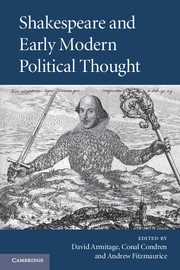Introduction
Published online by Cambridge University Press: 18 January 2010
Summary
Shakespeare and Early Modern Political Thought is the first collaborative attempt to situate Shakespeare's works within the landscape of early modern political thought. It brings together intellectual historians and literary scholars to engage in a common enquiry that both sides have, until recently, pursued apart, if they have pursued it at all. Intellectual historians who have followed the so-called ‘contextualist’ method of intellectual history have generally focused their attention on recovering the historical meanings of texts canonically collected under the heading of political theory: that is, for the early modern period, works by such figures as Niccolò Machiavelli, Thomas More, Jean Bodin, Hugo Grotius, Thomas Hobbes, James Harrington and John Locke. This style of intellectual history emerged originally as the means to interpret formal works of political argument, the great majority of which were composed as prose treatises: its first practitioners mostly overlooked other genres of early modern texts that also contain political reflection, most notably poetry and the drama. Literary scholars have generally been more open to applying the findings of intellectual history to their objects of study: indeed, placing works by such canonical figures as Edmund Spenser, Philip Sidney, Ben Jonson, John Milton and Andrew Marvell in dialogue with early modern political thought has been one of the major achievements of literary and historical scholarship since the 1980s. However, until very recently one major early modern writer has not been treated systematically as a participant in the political thought of his time: William Shakespeare.
- Type
- Chapter
- Information
- Shakespeare and Early Modern Political Thought , pp. 1 - 22Publisher: Cambridge University PressPrint publication year: 2009
- 1
- Cited by



